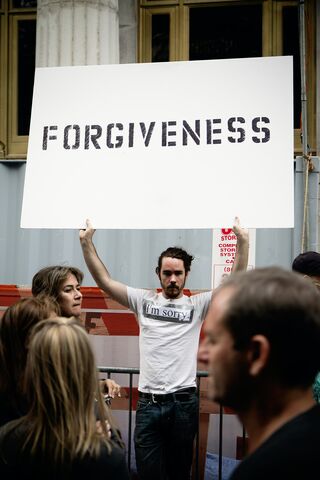Forgiveness
Sympathy as the Key to Forgiveness
Why is it so hard to forgive people sometimes?
Posted May 9, 2022 Reviewed by Davia Sills
Key points
- There are reasons why people act in ways that hurt others.
- While we may not always agree with their behavior, it helps to try to look at the situation from their perspective.
- This can create sympathy and make it easier to forgive.

Why is it difficult to forgive sometimes? To forgive may not be easy or inherently a natural human skill. But with motivation and understanding why it is so crucial to one’s health, learning how to authentically forgive will benefit everybody involved.
So, how do we forgive?
If somebody hurts us or those we love, we may want to reciprocate that hurt. I don’t have to tell you why this isn’t the most constructive way to deal with being hurt. You don’t have to agree, but they have reasons for what they have done. Their reasons in no way justify what they’ve done, and it can be true they still need to be punished, but on some level, they have reasons. If you are able to detach yourself personally from the experience and observe things from another person’s perspective, you may understand where they are coming from.
What if we want to forgive a person for the wrongs they subjected us to? How do we begin to understand why they did what they did? And importantly, how can we see where they are coming from if we don’t agree at all?
The simple answer to forgiveness is sympathy.
It is really hard for us to adopt a belief system of understanding because we tend to see things as black and white. If we can look through a filter of sympathy, we may be surprised by how much our anger lessens. There is no such thing as one person being entirely right and another person being entirely wrong.
Misunderstandings and anger often come out of not seeing things from the same perspective as the other person. If I could give you one skill that will help you, it would be to look at everything from multiple perspectives. If you only observe life through your personal perspective and experience, you are destined to be confused, hurt, and lost. So how do we look from another perspective?
People have perspectives that are born from many different factors. For example, mental illness, drugs, and hard childhoods can strongly influence someone's perspective and create bias and misunderstandings. These factors do not excuse problematic behavior. This is true. However, a sympathetic view helps us to better understand where the people who make choices based on these experiences are coming from.
Again, having an understanding viewpoint may not change anything. We may still do exactly what we're going to do. But it can help us relax and, with time, even forgive other people for the horrific things that they do to us. Hanging on to anger or hatred really is like poison. It's going to hurt us as much as it hurts anyone else. If we truly seek happiness in our lives, we have to learn to let go of that anger. If we don’t, it will continue to hurt us.
At the end of the day, people are doing their best. And their very best may be absolutely horrific. No kidding. But given their circumstances, given what they've gone through, given what they're facing, if you put it all together, I bet that you will come to the realization that, yeah, they are doing the best they can with what they have.
A real-life story of forgiveness:
To put this all into a real-life perspective, I want to share a beautiful story with you about understanding and forgiveness. This story is about Sharletta Evans and her 3-year-old son Casson, who was killed in a gang-related shooting gone wrong. The killer's name was Raymond Johnson. Raymond was 15 years old at the time; he was sentenced to life in prison for what he did.
Over the years, Raymond would write to Sharletta, expressing his deep remorse for what he had done to her son. At the time of the arrest, he had a third-grade education. While in prison, he ended up getting his GED, and he had extremely good behavior as a prisoner. Normally, families aren't allowed to meet or discuss anything with a killer. However, in the state of Colorado, they started a pilot program called “restorative justice” to see if there could be some healing.
Finally, when Raymond was 33 years old, he had a face-to-face meeting with Sharletta for the first time. As you can probably imagine, there was a lot of pain and healing that went on during that first meeting. Sharletta was able to experience massive healing and forgiveness through this process as well. Raymond was also able to experience forgiving himself by her reaching out and working through healing with him.
And she went on to become the president and founder of the recreation center. Because she felt that children, like Raymond was at 15 years old, shouldn't be sentenced to life for things that they did when they were so young. Well, because of all her work, Raymond was eligible to get released from jail and live his life. The most profound piece of this story is that Sharletta claimed, “I left there hugging Raymond. I accepted him as my son because he was absent of his parents.”[1]
I’m not telling you to be just like Sharletta because her level of forgiveness is exponential. I am, however, trying to shine a light on how possible and powerful forgiving and understanding are at their core. It is possible to forgive people for what they've done to us. And do you know the most wonderful thing about forgiveness? It lies within all of our hearts, and we can go through life with more understanding and less hate and hostility.




